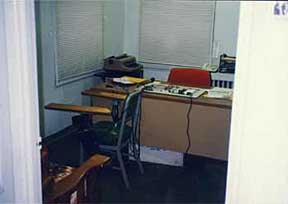 | | 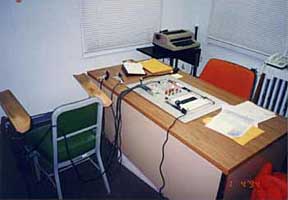
West Memphis Police Polygraph Room
The "P" Word
Prosecutor Brent Davis: You mean you don't want him to mention the "P" word?
Judge David Burnett: Yeah.
Attorney Val Price: Okay, that's what I was gonna ask. And that he's a "P" word person.
Burnett: Yeah. [Bench conference, Echols/Baldwin trial]
Approximately a year before the murders, the West Memphis Police
Department obtained a polygraph machine and Detective Bill Durham was
certified as a technician. Over the course of the
investigation, nearly fifty individuals were polygraphed.
The reasons why several individuals were not polygraphed were
noted. Using anti-epileptic drugs was one.
No polygraph - subject has seizures + takes Dilantin. [Bill Durham notes, Gary Poindexter interview, May 12, 1993]
This may have been why Mark Byers was spared. Other
individuals on psychoactive medications were polygraphed
including: Echols, taking an antidepressant; Timothy Dodson,
being treated for schizophrenia; and, Thomas Polletta, taking medicine
for PTSD.
Mild retardation was presented as a reason for not performing a polygraph.
Quirt is mildly retarded - has the mental capacity of about a 10 - 13 yr. old. [snip] He was fingerprinted but was not able to be polygraphed in Bill Durham's opinion due to his mental retardation. [Hester notes, Quirt Gregory interview, May 19, 1993]
Misskelley's borderline retardation did not excuse him, even though his
mental age was argued to be within or below the range attributed to
Gregory. Detective Mike Allen testified he did not know
Misskelley was mentally challenged.
Defense attorney Dan Stidham: Did you know that he was slow or mentally deficient in any form or fashion?
Allen:
In my opinion he was - he could understand everything I was telling him
and was responding back and didn’t appear to be - didn’t
appear to be slow, no. [Suppression hearing, January 13, 1994]
The "P" word - polygraph - was linked to another "P" word in this
case. During his confession, Misskelley was asked by Ridge if he
knew what a penis was. This was presented by the defense as
evidence the police were aware he was mentally slow. Ridge
defended his question.
Stidham: Can you explain to me why you had to explain to him what a penis was?
Ridge: That is not a term that is normally used by everybody in the community. [ibid]
Pass/fail
There are currently 41 polygraph reports available for those who took
the examination. These included witnesses and suspects.
Many of the questions were not directed at whether someone was
personally involved in the crime; a finding of deception is not necessarily related to
guilt. According to the reports, 13 individuals had shown at
least one response classified as "deception indicated."
When one or more responses were deemed deceptive, a rationale was
often provided in the post-polygraph notes. James Martin, the
child molestor, failed two questions: "Do you know who killed
those three boys?" and "Do you know what was used to tie up those
three boys?" His reasons for failing were presented as
In
the post test interview, the subject said he thinks shoe laces were
used to tie the boys because logic tells him that the killer would use
something already there. He also said he thinks the father of Steve
Branch killed the boys. [Durham notes, James Martin post-polygraph interview, May 19, 1993]
Suspicion of someone was said to be sufficient to have Martin fail one
question. In his extended interview before the polygraph, he
mentioned the stepfather of Stevie Branch as someone he suspected.
The other question, the specific knowledge of being tied with
shoelaces was dismissed as something he had determined logically - even
though in his interview he had said the perpetrator would be
prepared and bring something to tie the victims.
Passing the polygraph was repeatedly equated with innocence. Louis Larry Baldwin, a
local child molestor and the uncle of Jason Howard Baldwin (the "other"
Jason Baldwin), offered no verifiable alibi. However, "Baldwin was
scheduled to take a polygraph Friday July 2, 1993 at 10:00 a.m to clear
up any suspicions of his involvement." [Mike Allen notes, Louis Larry
Baldwin interview, July 1, 1993] (He passed.)
Kacie Crawford claimed to have heard Frankie Knight say his brother
killed the boys. Knight was said to have threatened Kacie not to
report this. On the bottom of her report, a large UNFOUNDED
was
scribbled in marker. Frankie Knight and his brother were said to
have been "found to be
clear of any suspicion at this point." Why? Knight's family
knew the Byers, one of his brothers was friends with Ryan Clark.
His older brother, David Wren, had amassed a remarkable criminal
record for a teenager, including a jail break. In his interview
Knight
presented no alibi. But he did pass his polygraph. Wren
also passed his polygraph.

Questions 6 through 10 of the Sudbury questionnaire.
Open to Interpretation
Not only were results open to rationalization, they were open to
interpretation. Detective Durham concluded Misskelley had failed
his polygraph examination, "lying his ass off." Misskelley's
attorneys recruited Warren Holmes, a polygraph expert who had worked on
the John F. Kennedy and Martin Luther King assassinations. Holmes
read Misskelley's polygraph charts and concluded he had only lied about
past drug use.
If polygraphs are valid and
Holmes was correct, then Misskelley is innocent. If polygraphs are invalid, the
entire foundation of the investigation was flawed.
A Lie Detecting Stone
I have a lie-detecting stone. It will dance and sing when people
lie. Over the course of my investigation, I place it in front of
fifty people. I interview them and it does nothing - it is, after
all, a stone. Later, after two of these individuals are found
guilty, my stone can claim a 96% success rate. It correctly did
nothing when the 48 innocent people spoke in front of it, only failing
to move for the two guilty.
The
problems with polygraphs are more complicated than this. Unlike
the stone, people do register responses. Deception, when the stakes are
high, can initiate an elevated physiological reaction. The
problem is that the results are not presented as such. It was not said, "specific
questions elicited unusually heightened reactions." It was said
Misskelley was "lying his ass off." And there's the rub:
polygraphs are not given the weight of machines that etch out multiple
graphs - they are claimed to be "lie detectors."
Various figures are bandied about for the accuracy of polygraphs.
They are "95% accurate in the hands of a specialist." (Not
as accurate as my stone.) Such statements make scientists
cringe. Scientists want data that speak for themselves, not ones
that only communicate via an elite priesthood. How does one know a
given
practitioner has that 95% accuracy or is only at 70%?
Polygraphs,
in their ambiguities, solidify the prejudices of an investigation.
They blunt the rational investigation. The things that
make a good suspect are prior behavior, connection to the victims,
indirect or physical evidence. These should not be negated or held hostage to the
degree of physiological reaction suspects exhibit when they lie or tell the
truth.

Detective Ridge notes, Misskelley polygraph. "Lying his ass off"
| Gary Ray Chadwick |
05-07-1993 |
(no deception indicated) |
| Timothy Robert Cotten |
05-08-1993 |
(no deception indicated) |
| Damien Wayne Echols |
05-10-1993 |
(deception indicated) |
| Christopher Douglas Littrell |
05-10-1993 |
(no deception indicated) |
| Deanna Jane Holcomb |
05-11-1993 |
(deception indicated to one question) |
| Murray J. Farris |
05-11-1993 |
(no deception indicated) |
| Henry Franklin Knight |
05-11-1993 |
(deception indicated to one question) |
| LG Hollingsworth, Jr. |
05-11-1993 |
(deception indicated to one question) |
| Christopher Wayne Wahl |
05-11-1993 |
(no deception indicated) |
| Kenneth Eugene Cagle |
05-12-1993 |
(no deception indicated) |
| David Shane Wren |
05-13-1993 |
(no deception indicated) |
| Edward Lynn Lucas |
05-13-1993 |
(no deception indicated) |
| Richard Raymond Simpson |
05-14-1993 |
(no deception indicated) |
| Jerry Alan Nearns |
05-14-1993 |
(no deception indicated) |
| Timothy Wayne Dodson |
05-14-1993 |
(no deception indicated) |
| Thomas Charles Polletta |
05-14-1993 |
(no deception indicated) |
| Robert DeAngelo |
05-15-1993 |
(no deception indicated) |
| Danny Wayne Leffler |
05-15-1993 |
(no deception indicated) |
| Steve Dewayne Skaggs |
05-15-1993 |
(no deception indicated) |
| William Lawrence Welch |
05-15-1993 |
(no deception indicated) |
| Charles Douglas Morton |
05-17-1993 |
(no deception indicated) |
| James Kenney Martin |
05-18-1993 |
(deception indicated to two questions) |
| Anthony A Barnes |
05-18-1993 |
(no deception indicated) |
| Michael Leiter |
05-25-1993 |
(no deception indicated) |
| Charles Michael Craig |
05-25-1993 |
(deception indicated to one question) |
| Joseph Michael Reneau |
05-26-1993 |
(no deception indicated) |
| Richard Raymond Simpson |
05-26-1993 |
(deception indicated) |
| Dustin Charles Boyle |
05-26-1993 |
(no deception indicated) |
| Jeffrey Paul Looney |
05-27-1993 |
(no deception indicated) |
| Victoria Hutcheson |
06-02-1993 |
(no deception indicated) |
| Jessie Misskelley |
06-03-1993 |
(deception indicated) |
| Jason Lance Crosby |
06-08-1993 |
(no deception indicated) |
| Louis Larry Baldwin |
07-02-1993 |
(no deception indicated) |
| David Sims |
07-16-1993 |
(no deception indicated) |
| Ronald George |
08-09-1993 |
(no deception indicated) |
J. Allen (pseudonym)
|
09-10-1993 |
(deception indicated) |
| Kenneth Clyde Watkins |
09-16-1993 |
(deception indicated to three questions) |
| Christie Dawn Jones |
10-01-1993 |
(no deception indicated) |
| Sandra K. Nodini |
10-04-1993 |
(deception indicated) |
| Kenneth Clyde Watkins |
10-12-1993 |
(deception indicated to two questions) |
| Buddy Sydney Lucas |
10-14-1993 |
(deception indicated to three questions) |
|


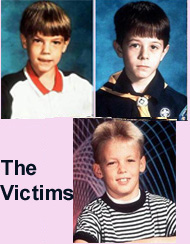
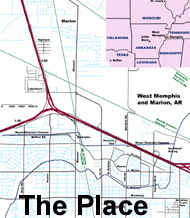
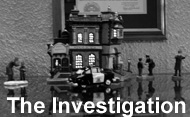
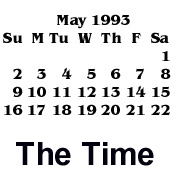
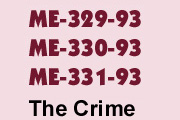
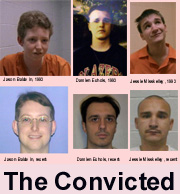
![]()